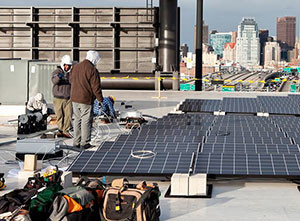
— Photo courtesy of MassSolar.
By State Representative Denise Provost
The Background:
In 2008, our legislature adopted laws committing MA to lower its carbon emissions (the “Global Warming Solutions Act”), through actions that would increase our use of renewable energy (the “Green Communities Act”). To optimize the production of electric power through solar photovoltaic (PV) panels, our legislation required electricity distribution companies to purchase surplus solar energy from producers at the retail rate (what consumers pay for electricity.) The ability of solar producers – including homeowners with rooftop solar – to pay a “net” electric bill (the cost of the power you purchased, minus cost of power you sold back to the grid) is how “net metering” works.
Since 2008, solar energy has taken off in Massachusetts. For a while, we were the number three solar producer in the nation -+ though we’ve slipped to fourth place. While our net metering law unleashed demand for solar PV installations, it also set caps on the amount of solar energy that electricity distribution companies would have to buy back from solar energy generators in their geographic areas.
When caps are reached, it can become impossible for solar generators to sell electricity back to the grid, squandering the many benefits of distributed solar power generation. Besides being free from carbon emissions, solar power allows us to diversify our energy supply, making us less dependent on expensive spot market energy when demand spikes. As storage battery technology continues to improve, the benefits of solar will only multiply.
Where we are now – and how we got here:
In July of 2014, the legislature raised the net metering cap by a small amount, to avoid reaching caps and allow the continued expansion of solar. On March 31, 2015, the cap was reached for commercial-scale solar projects in National Grid’s territory of 171 cities and towns. I spoke personally to Gov. Baker on that day about the need to raise the cap; he was noncommittal then, but subsequently took a public position opposing the raising of net metering caps. In July, 2015, the Senate engrossed a Climate Change Adaptation bill with an amendment eliminating net metering caps. The House but took up the Senate net metering amendment (disposing of Climate Change Adaptation in the process), and released its own net metering bill on November 17, 2015.
Why I voted against the House bill:
House members (myself included) filed 27 amendments to the net metering bill; adopting even a few would have improved the House bill in important ways – but no such amendments were adopted, and I voted against the bill. The House bill proposed a tiny increase (2%) to the cap, which would have likely been used up in just a few months. Worse, the bill would have changed the payment for solar power from the retail rate to the wholesale rate – a difference of approximately 13 cents per kilowatt hour – undermining the economics of solar generation. Although the Senate, in conference committee, quickly agreed to lower the cap increase to 2%, no agreement could be reached between the branches, and the net metering cap remains in place.
As State House News Service has reported, “come January the pressure will ratchet back up on conferees to strike a deal. The disagreement over solar is serving as a prelude to a broader debate next year over energy policies. Offshore wind and Canadian hydroelectricity interests are angling for a piece of the energy mix as lawmakers weigh price, reliability and demand issues that will be exacerbated with the Pilgrim Nuclear Plant shutdown.”
What can individual voters do?
I know that many of you support renewable energy, and the use of net metering – many of you have contacted me about this issue. Here are some things you can do:
Stay informed – the MassSolar website, is a good resource, where you can sign up for its email list for updates; many environmental organizations also provide good information.
Continue to let me know where you stand and what you’re thinking.
Contact people you know in other districts, explain why this is important, and ask them to contact their legislators.
Let Governor Baker know you support solar and other forms of clean energy.














Reader Comments